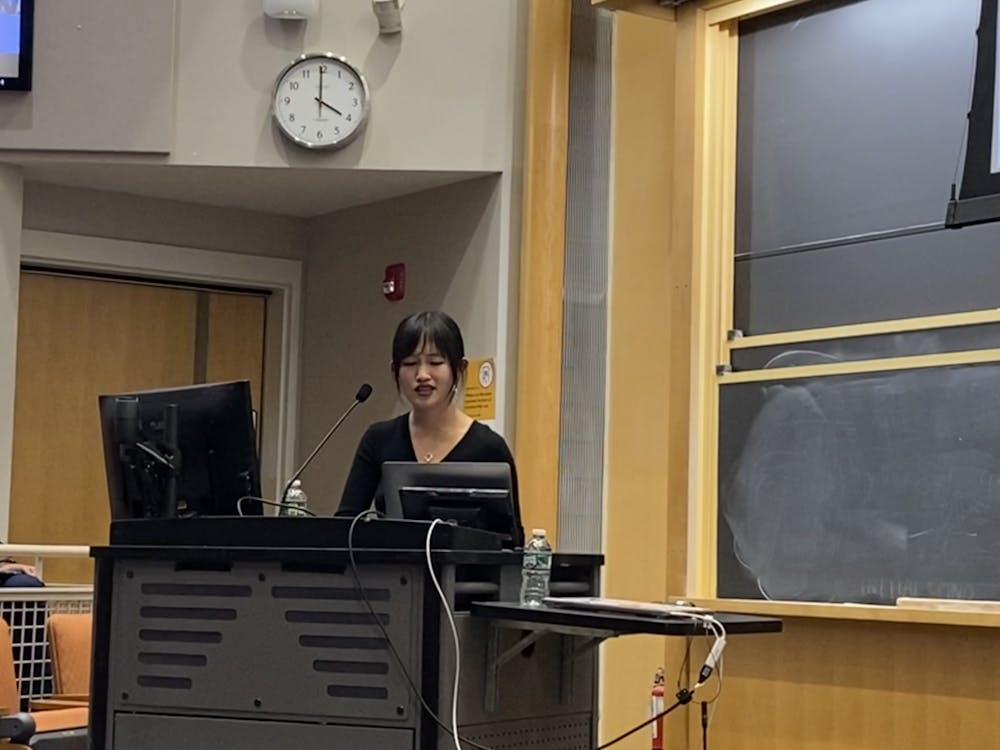On Friday, best-selling Chinese American fantasy author and translator Rebecca F. Kuang joined the Comparative Literature Departmental Undergraduate Group for a guest lecture and book signing in MacMillan Hall. Kuang discussed combating the ties between imperialism and academia and offered insight into her newest book “Babel,” which was released in August.
Currently, Kuang is a PhD candidate in East Asian Languages and Literature at Yale, where she studies representations of war, trauma and nationalism in modern and contemporary Chinese fiction as well as decolonization, race, class and intersections of Sinophone literature with Asian American literature.
Aside from “Babel,” Kuang wrote the Poppy War trilogy. “The Poppy War,” the first of this series, won the 2019 Compton Crook Award for best first English-language science fiction, fantasy or horror novel of the year and the 2019 Crawford Award. Kuang also won the 2020 Astounding Award for Best New Writer and was a finalist for the 2019 Campbell Award for Best New Writer.
“I’ve always been interested in what marginalized writers in Anglophone publishing (are doing) when they’re interfering in literary canons where they have been recently excluded from,” she said.
Kuang also addressed the ethics of representation when media has color-blind casting, such as the cast of “Bridgerton” and Dev Patel playing David Copperfield in “The Personal History of David Copperfield.” She wonders whether “we are just projecting unproductive racial fantasies,” she said. Is “the only solution … color-blind retconning or sticking to all-white period pieces in order to be accurate?”
Kuang explained how during her writing process, she tries to thoughtfully engage with literary forms that have been out of style for centuries and how to learn from Victorian writers.
“The way I think about style and lay the groundwork for this style (is through) vocal training and imitation,” Kuang said. “Vocal training is reading as widely as possible in the genre you want to go into.”
Kuang focused on vocal training with Charles Dickens and other Victorian writers when drafting “Babel” with the goal of making it sound “as different from the ‘Poppy War’ trilogy” as possible, she said.
Kuang added that vocal training allowed her to gain a new perspective on Victorian authors. “My perception of Victorians was that they were stifling, but they were actually lusty and had inappropriate feelings with nowhere to put them,” she said. “I really adore the deeply descriptive, sometimes overwritten, very opinionated and naughty style of Victorian literature.”
“I fell in love with the sprawling diction and structure of the Dickensian bildungsroman,” she said. “Dickens taught me to take my time (and) dither around in the moment,” a strategy that works better for coming-of-age stories than the tighter structure she uses for action novels like the Poppy trilogy, she explained.
While speaking on the powers of imitation, Kuang advised the audience to try an experiment. She recommended choosing an exemplary passage of a work and writing a stylistically similar passage in a world of their creation in an attempt to mimic the author’s voice. The exercise encourages participants to push their comfort levels with new uses of imagery and sentence structure.
Kuang also addressed mimicry, a practice in which colonizers force colonies to take up the colonizer’s language, and the ambivalence of colonial discourse. “There’s something very sad about this mimicry … but it can also be an insurgent act,” she said. “Mimicry radically revalues the priority of race, writing and history. It deauthorizes the colonizer.”
By consciously replicating the norms that give the colonizer power in her writing, she aims to expose the way many of these norms are farces, she said. In “Babel,” she exposes as ridiculous “all those antiquated norms of British prestige” including “the snobbery of various types of robes.”
“The novel deconstructs the prestige and uniqueness of things that we see as untouchable European canon,” she explained. “They’re just ordinary texts with too many run-on sentences.”
Throughout her lecture, Kuang also referenced Tina Chen’s text “Double Agency: Acts of Impersonation in Asian American Literature and Culture.” Kuang defined “the politics of impersonation” as a “temporary assumption of stereotypes to deconstruct those very stereotypes … and interrogate what those roles signify.”
“A lurking fear of betrayal is integral to how Asian Americans have been seen in America. We have been historically suspect as snaky, secretive, inscrutable,” she said. “The only way we can be ‘American’ is through impersonation — the politics of impersonation is a response to the charge of being an imposter. Impersonation acknowledges its own fictionality.”
Kuang said she employed impersonation in “Babel,” inserting the book into genres and literary discourses where it was never meant to be.
Kuang noted that although “Babel” could be considered a quintessential bildungsroman, in some ways it wasn’t one at all. Every character in “Babel” was a reversal of the characters you would typically meet in a Dickensian coming-of-age story like “Oliver Twist,” “Great Expectations” or “David Copperfield,” she added.
“Babel is impersonating a text that a middle-aged white lady would read in a book club. Babel lists as comparative titles with other white authors to show that this falls comfortably into the canon that the reader is used to,” Kuang said. But then the reader realizes that what they thought was a Victorian novel was actually a decolonial novel about China and the rest of the colonized world, she explained.
Kuang concluded her lecture by highlighting the dangers of losing one’s work to mimicry. “‘Babel’ went viral on Tiktok for its ‘dark academia’ aesthetic,” she said. “I sometimes wonder whether ‘Babel’ has camouflaged itself too effectively.”
Seoeun Choi is a staff writer in Arts & Culture and University News. She is a junior from Frankfurt, Germany studying comparative literature (English, German, Korean) and history.





